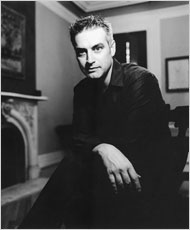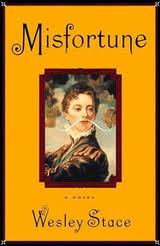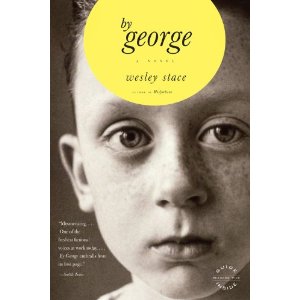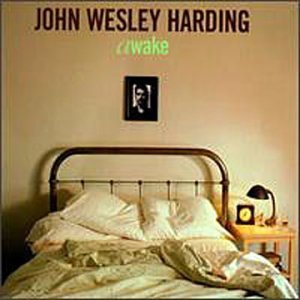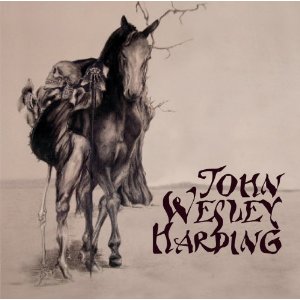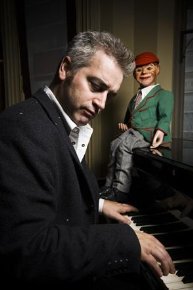Prior to writing his first novel, Misfortune (published in 2006), Wesley Stace was no stranger to the entertainment world. The native of England had been a popular recording artist for the better part of two decades, releasing critically acclaimed albums as John Wesley Harding. Nowadays, he is living in the US where he juggles his two careers with the joyous abandon of his live concerts. Stace’s newest novel, Charles Jessold, Considered as a Murderer, was published in February of this year. Like his two other novels, this one takes the reader back in time (in this case, England in 1923), but for this book Stace also sprinkles a bit of murder, classical music, and opera into the plot’s batter. A portion of the publisher’s synopsis tells us:
This ambitiously intricate novel is set against a turbulent moment in music history, when atonal sounds first reverberated through the concert halls of Europe, just as the continent readied itself for war.
Stace’s first novel, Misfortune, was a project that had been on his mind for many years. The seed was planted when, as John Wesley Harding, he recorded a song called “Miss Fortune” on his 1997 album Awake. The resulting novel told the story of Rose, a boy raised as a girl by a wealthy — and very eccentric — British family in the 1800s. There were the inevitable comparisons to Dickens, due in part to Stace’s writing style and his cast of colorful characters, but clearly this was the work of writer with a unique new voice.
His second novel, By George, was the tale of a boy named George and his cherished companion, an old ventriloquist’s dummy also named George. Once again, Stace set the story in the past (this one bounces between the 1930s and the 1970s) and uses clever dialogue and a cast of intriguing characters, changing narrators (both the boy George and the dummy George), along with deft plotting to create yet another engagingly addictive story.
I first met Wes back in 1990 when he was on a US tour with the Mighty Lemondrops and Ocean Blue. I had connections with the Alternative Marketing Department at Warner Brothers and they arranged for John Wesley Harding to make an in-store appearance at my record store in Orlando. He brought along his acoustic guitar and entertained the crowd with a few songs and some witty banter. The unanimous consensus was: this was a very nice guy with some very good tunes! Later that year I made a trip to Atlanta to visit friends at record labels and distributors. I arranged to meet Denise Sullivan, my Warner Brothers rep, at an Atlanta Braves game one day. She showed up with a friend in tow. “Do you remember Wes?” she asked. It took me a second or two for the mental cobwebs to clear; “Wes” was John Wesley Harding! During the game we talked music, books, and baseball. Wes said that he enjoyed baseball, but like many of his countrymen, he couldn’t avoid the inevitable comparison to cricket. He said that Steve Wynn (founder of the Dream Syndicate) had been the first person to take him to a baseball game.
Since his early albums for Sire/Warner Brothers, when he was compared to Elvis Costello, John Wesley Harding has forged his own musical course, releasing a series of consistently fine albums, all characterized by strongly melodic tunes with literate and witty lyrics. With so many different influences, it’s very hard to pigeonhole his sound. Being a singer-songwriter-guitarist with folk roots, using an obviously “inspired” recording name, it’s tempting to compare him to Bob Dylan, yet the music of John Wesley Harding doesn’t much sound like it was spawned on Highway 61. There’s still an ever-so-slight hint of Costello timbre in his vocals, along with some 60s folk and 70s pop influence in his songs, but when all is said and strummed, the music of John Wesley Harding is its own distinct creature.
I just ordered his newest album, 2009’s Who Was Changed & Who Was Dead, and have haven’t yet heard it, but from all reports it’s a typically stellar JWH effort. The CD also includes a bonus disc of live material, recorded at Union Hall in Brooklyn. Speaking of performances, another one of Wes’s current projects is The Cabinet of Wonders, a genre-bending road show that combines live music, comedy, drama, and readings from various writer and musician friends. Audiences have been treated to appearances by authors such as Colum McCann, Rick Moody, Mary Gaitskill, and Elizabeth McCracken, along with musical contributions from the likes of Roseanne Cash, Josh Ritter, Andrew Bird, Allison Moorer, and Kristen Hersh. I caught up with Wes by e-mail recently and pestered him with some questions about his new book and ongoing music career.
For those that followed your music career, the leap to writing novels seems a quite natural one for you. Did being a musician for so many years hinder your development as an author, or do you think it was helpful in the end?
Helpful, in that it taught me to trust words and let them flow from me without self-consciousness. The editing processes are very different, of course, but I think it actually put me at an advantage. Writing School would have probably made me a quite different writer. I sometimes wish I’d started writing the novels earlier, but then the first one took me seven years, and I wouldn’t have had the patience earlier on in my life.
The new novel, Charles Jessold, Considered as a Murderer, uses classical music as an element in the plot. As a result of doing research for that novel, has it given you a greater interest in, or appreciation for, opera and classical music?
Absolutely. I actually went in knowing I wanted to write about music, knowing I didn’t want to write about anything approaching my musical life and not knowing a lot about classical music. Because of the milieu of the novel, and the time at which it’s set, it certainly gave me a greater appreciation of the music of the first English Folk Renaissance which is responsible for the later more rocking English Folk Renaissance of the 60s — those composers include Butterworth, Vaughan Williams, Grainger, Bax, Boughton and so on. Beautiful.
Do you listen to, or buy, much music nowadays? Are there any newer artists who have impressed you?
Josh Ritter is the best singer-songwriter nowadays in my opinion. I like The Decemberists and The Fiery Furnaces — their live album Remember blew my mind this last year. I don’t buy as much new music as I might, but I do have close friends who know my taste and tell me what they think I’d like and that’s a good way of keeping up. I don’t read rock press or reviews so I’m never very up-to-date. I recently discovered the Flaming Lips, for example. Pathetic, I know, but one comes to everything in one’s own time. I’m still trying to catch up with some of the better music of 1972.
In these days of digital downloads, it’s becoming more difficult for artists to sell their music. Is there anything that can be done to reverse this downward spiral? How are you selling and promoting your own albums nowadays?
Well, I put out the last one more or less myself and that was fun but I haven’t got the time to do it with the next album, coincidentally made with members of the Decemberists (minus Colin Meloy, naturally, since I handle the singing!) and that’ll come out later this year. As many people have worked out, the way to reverse the downward spiral, is to rediscover and celebrate the beauty of the physical object. CDs were never that nice to begin with. Now people are making things beautiful again, and it makes you want to own them. Check out the expensive version of the latest Decemberists album (The King is Dead) — it’s quite literally a work of art.
During your travels around the world, which are among your favorite cities to visit, and why?
Paris, because it’s so perfect. I always wanted to go to India, but I never have. There was talk recently about a literary festival in Jaipur which excited me beyond belief. Tokyo is a fantastic city to visit as well.
As a child, you were obviously a big reader. What are some of your favorite books or authors?
So many. Hard to pick a few out, but —- Barbara Comyns, Laurence Sterne, Patrick Hamilton, Lord Berners, Charles Dickens. When I was young, I loved adventure stories. And I think that the trace is there in my novels, in a quiet way.
Do you have much time to read these days? Best book — new or old — you have read recently?
Oh, that’s easy: The Terrible Privacy of Maxwell Sim by Jonathan Coe. It’s a difficult book in one way, an easy book in another, and powerfully moving overall. Extremely subtle, when it doesn’t seem to be subtle in the least. That’s beyond subtle.
How did you first get turned on to music, or what do you think gave you the incurable music bug?
My family is musical and there was always music around the house. One sister is currently singing opera in Italy, the other is singing cabaret in Vienna, and my mother is currently giving a singing lesson downstairs at the family seat in Hastings, where I currently am. I picked up the guitar relatively late, but I already knew not to be self-conscious about. I just had to wait for the urge to hit me. And it as the need to write songs that gave me the urge.
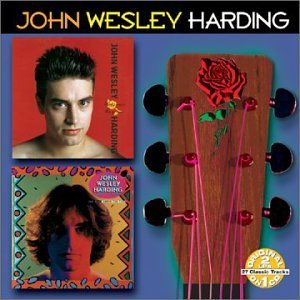
I had a look at the 100 Jukebox selections that you posted on your website recently. Some great songs there! Can you recall the first singles you bought? How old were you when you “graduated” to buying albums? And what were some of your first LP purchases?
The first three LPs I bought with a pay packet, probably when I was about 12, were: David Bowie Lodger; Roxy Music Manifesto; The Cars The Cars. That was at Rye Record and Denim, at whatever was the relevant time for those three records. That more or less changed my life. I think I bought Bob Dylan At Budokan with my next pay packet. The first single I was bought, for my 4th birthday by my mother, was “Simon Smith and the Amazing Dancing Bear” by Alan Price Set, which I used to hear on Junior Choice on Radio One. Amazingly, it’s by Randy Newman, which is interesting since he became such a major influence. And that single is one of the 100 on my Seeburg VL-200!
Any dream list of other musicians you would like, or would have liked, to play with?
I’ve been very lucky that way. “The Cabinet of Wonders” means I’ve been joined by amazing musicians just at the past two gigs: Andrew Bird, Josh Ritter, Kristin Hersh, Tift Merritt, Ted Leo, Carl Newman — so much fun. The trouble about so many of the people I’d like to make music with, with whom I haven’t yet made music, is that they’re “difficult” so you have to be careful what you wish for. Let’s just say Neil Young, for fun.
Which of your albums are you most proud of, and why?
Always the most recent one. But in this case, the next one.
Do you have any other goals or unfinished projects, either in music or literature, that you would like to accomplish?
I still want to write the libretto for an opera. The composer Errollyn Wallen and I almost had a commission for one, but it didn’t seem to quite pan out. So we’re still working on it. I’m optimistic it will happen. And I’m very excited about that.
http://wesleystace.com/
